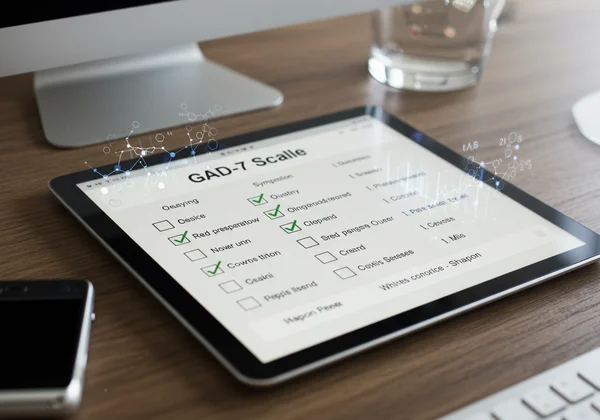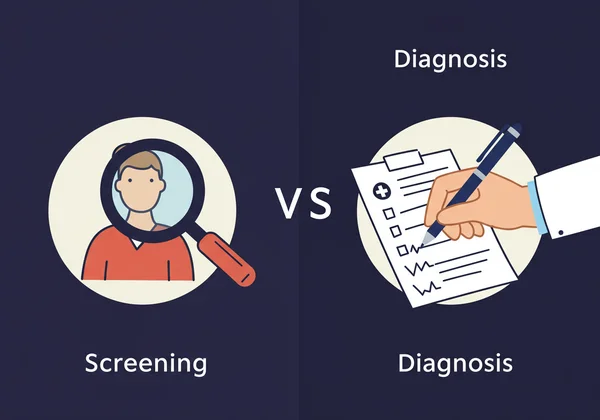Online Anxiety Tests: Accuracy & Reliability Explained
August 10, 2025 | By Isla Caldwell
In our fast-paced world, feelings of worry, stress, and unease are common. You might find yourself wondering if what you're experiencing is normal stress or something more. This brings up an important question: How much can you trust online anxiety tests? If you're considering using an online tool to better understand your feelings, you're looking for clarity, not more confusion. The internet is filled with quizzes, but discerning which ones are trustworthy is key.
In this guide, we'll demystify online anxiety tests. We'll explore the science that makes them valid, what their accuracy really means, and how you can use them as a powerful tool for self-awareness. A well-designed assessment, like the free anxiety test on our site, can be a reliable and confidential first step on your mental wellness journey. Let's dive into what makes an online anxiety assessment a resource you can trust.

What Makes an Online Anxiety Test Valid?
An online anxiety test isn't just a random quiz; its validity comes directly from established psychological science. A credible test is far more than a simple list of questions. It's a carefully constructed instrument designed to measure specific symptoms and patterns associated with anxiety. For a user seeking reliable information, understanding this foundation is the first step toward building confidence in the results.
A truly valid anxiety test relies on frameworks developed and trusted by mental health professionals. This ensures the questions you answer are relevant, meaningful, and aligned with how anxiety is understood in a clinical context. It separates a helpful screening tool from a generic online quiz.
The Role of Clinically Validated Scales (e.g., GAD-7)
At the heart of any reliable anxiety assessment is a clinically validated screening scale. One of the most respected and widely used is the GAD-7 scale (Generalized Anxiety Disorder 7-item scale). This isn't just a random set of questions; it's a diagnostic tool developed and tested through rigorous research to effectively screen for generalized anxiety disorder.
The GAD-7 asks you to reflect on how often you've been bothered by seven core symptoms of anxiety over the past two weeks. These include feeling nervous, being unable to stop worrying, and having trouble relaxing. Because the GAD-7 is used by doctors and therapists worldwide, a test based on it provides a score that is both meaningful and comparable to clinical standards. This scientific backing is what gives a GAD 7 anxiety test its credibility.

How Psychological Principles Guide Test Development
Beyond using a specific scale, the development of a trustworthy anxiety assessment test is guided by core psychological principles. The two most important are validity and reliability. Validity means the test measures what it claims to measure—in this case, anxiety. Reliability means the test produces consistent results over time.
Test creators use these principles to craft questions that are clear, unambiguous, and directly related to the known emotional, cognitive, and physical symptoms of anxiety. This ensures that your responses paint an accurate picture of your experience. When you take a test built on these foundations, you are engaging with a tool designed with the same care and expertise found in professional psychological resources.
Understanding Online Anxiety Test Accuracy
When discussing the accuracy of an online anxiety test, it's vital to understand what 'accurate' truly means here. The primary goal of a tool like this is not to give a formal diagnosis but to provide a highly accurate screening. It’s designed to identify the presence and severity of anxiety symptoms, empowering you with information to take the next step.
The precision of a well-made anxiety level test comes from its foundation in scientifically-backed questionnaires. It provides a data point—a snapshot of your current mental state—that can help you make sense of complex feelings. This objective score is a powerful starting point for self-reflection or a conversation with a healthcare provider.
Screening vs. Diagnosis: What Online Tests Can & Cannot Do
This is the most important distinction to understand: an online anxiety test is a screening tool, not a diagnostic instrument. Think of it like a home thermometer. If it shows a high temperature, it accurately indicates a fever, but it doesn't tell you if the cause is the flu, an infection, or another illness. Only a doctor can make that diagnosis.
Similarly, an online anxiety test can accurately tell you if your symptoms align with low, mild, moderate, or severe levels of anxiety. It provides a reliable anxiety score that flags a potential issue. However, it cannot diagnose a specific anxiety disorder like social anxiety or panic disorder. A formal diagnosis can only be made by a qualified healthcare professional who can consider your full personal history and context. Our tool is designed to be the first, informative step in that process. You can take the test to get your initial screening.

Disclaimer: This article is for informational purposes only and does not constitute medical advice. Our test is a screening tool, not a diagnostic instrument. Please consult a qualified healthcare professional for any health concerns.
Factors Influencing Your Anxiety Test Results
The accuracy of your results also depends on you. To get the most reliable outcome, your honest self-reflection is essential. Several factors can influence the results of your self-assessment for anxiety. Being mindful of them can help you get the clearest possible picture of your emotional state.
Your current mood, stress level, and even the time of day can have an impact. For the best results, try to take the test in a calm, private environment where you won't be interrupted. Reflect on your feelings over the past two weeks, not just in the present moment. Answering honestly, without judgment, will provide you with the most valuable and accurate insights into your experience with anxiety.
Benefits of a Reliable Online Anxiety Assessment
Engaging with a reliable anxiety test offers more than just a score; it provides a pathway to greater self-understanding and empowerment. For many, especially those hesitant to speak to someone, it serves as a crucial, private first step. It validates your feelings and transforms vague worries into tangible information you can act on.
The primary benefit lies in its accessibility and immediacy. Within minutes, you can gain objective insights that might otherwise take weeks to obtain. This information can be a powerful catalyst, helping you move from a state of uncertainty to one of clarity and proactive self-care.
Gaining Self-Awareness & Initial Insights
One of the most significant benefits of a self-assessment anxiety tool is the gift of self-awareness. When you are struggling with persistent worry, it's easy to feel lost or overwhelmed. Quantifying your experience with a score can be incredibly validating. It provides objective confirmation that what you're feeling is real and significant.
This initial insight helps you name your experience. Instead of just "feeling stressed," you can see a clearer picture of your anxiety level. Here, we take this a step further. After your initial score, you have the option to receive our AI-powered report, which offers personalized insights into your unique strengths and challenges, giving you a deeper level of understanding.
A Confidential First Step Towards Support
For many, the fear of judgment or stigma is a major barrier to seeking help. The beauty of a confidential anxiety test is that it removes this fear. We prioritize your privacy above all else. You don't need to register, create an account, or provide any identifying information. The process is completely anonymous.
This confidential space allows you to explore your feelings without pressure. It serves as a safe, private first step toward acknowledging your mental health. The results can be a personal tool for reflection or a concrete starting point for a conversation with a doctor, therapist, or trusted loved one. Knowing you can gain insight privately empowers you to take control of your wellness journey on your own terms.
Taking the Next Step with Confidence
Understanding the accuracy and reliability of online anxiety tests empowers you to use them wisely. A credible test, based on clinical scales like the GAD-7, is not a frivolous quiz but a valid screening tool. While it cannot replace a professional diagnosis, it provides invaluable, confidential insights that can validate your feelings and illuminate the path forward. It transforms uncertainty into actionable awareness.
You are not alone in seeking answers. Recognizing the need for clarity is a sign of strength. If you're ready to take a confidential, science-backed step toward understanding your anxiety, we're here to help. Take the free anxiety test now to receive your instant results and a personalized AI-driven report with actionable advice.
Frequently Asked Questions About Online Anxiety Tests
How accurate are online anxiety tests?
Reputable online anxiety tests based on clinical scales like the GAD-7 are highly accurate as screening tools. They reliably measure the severity of common anxiety symptoms. However, they are not diagnostic tools and cannot replace a consultation with a healthcare professional for a formal diagnosis.
What is the GAD-7 scale and why is it used?
The GAD-7 (Generalized Anxiety Disorder 7-item) is a scientifically validated questionnaire used by clinicians worldwide to screen for and measure the severity of generalized anxiety. Its use in an online test ensures the questions are relevant and the results are meaningful, providing a credible foundation for the assessment.
Can an online anxiety test diagnose me?
No, an online anxiety test cannot provide a medical diagnosis. It is a screening tool designed to indicate the presence and severity of anxiety symptoms. A formal diagnosis of an anxiety disorder must be made by a qualified doctor or mental health professional who can assess your complete health profile.
How can I test myself for anxiety?
Using a confidential, science-backed online tool is an excellent way to test yourself for anxiety symptoms. A reliable test, like the one we offer, guides you through questions based on the GAD-7 scale to provide an instant, private assessment of your anxiety level. Ready to begin? Start your test now.